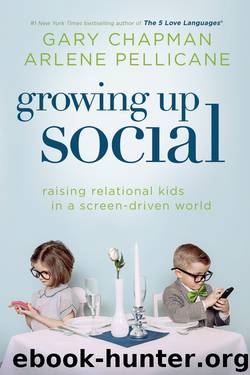Growing Up Social by Gary Chapman

Author:Gary Chapman
Language: eng
Format: epub
Publisher: Moody Publishers
Published: 2014-10-21T04:00:00+00:00
Five Things Not to Say to Your Reserved Child
1. Don’t be shy.
2. Don’t worry; they won’t bite.
3. Don’t just sit there. Say something!
4. Cat got your tongue?
5. Why can’t you be outgoing like your sister?
rejection, bullies, and bad hair days
Six-year-old Wendy came home in tears—again. Since changing to a new school three weeks earlier, she still hadn’t been able to make friends. She was shy, and the move was especially hard on her. Today at lunch she had made a brave attempt to sit next to some girls from class, but they looked up and said, “Sorry, we don’t have any more space at this table.” She quietly found another place to sit in the cafeteria as she fought back tears.
Since Wendy wasn’t having much success in the friend department, she stopped trying to initiate conversations at recess. She became more withdrawn in the classroom, often avoiding eye contact with her classmates and teacher. At home, she started watching a lot more television after school.
Eric, eleven, loved playing soccer, but he dreaded going to practice. One of his teammates, Luke, twelve, constantly made fun of him. He’d say things like, “If you want to score, don’t pass the ball to Eric” and “Who taught you to play? A bunch of girls?” Eric didn’t tell his parents about the bullying. Instead he threw himself into his video games where he could be the one calling the shots.
When kids like Wendy and Eric have trouble in social settings, it’s easier than ever to retreat to the safety of screens. If you feel left out, just fiddle with a smartphone or play a video game. You’ll look busy, occupied, and important. Being with screens is a lot easier than being with people. Screens don’t care if you say or do the right thing. They will not judge your comments or behavior. You don’t have to put your best foot forward or risk embarrassment or rejection. Your tablet doesn’t care if you’re having a bad hair day and it won’t ever make fun of you. You can simply be with a game or television program that makes you feel connected with very little effort.
If a shy child spends three, four, or five hours a day watching television or playing video games, what is that child missing out on? Healthy human interactions like sitting around chatting with family, shopping for groceries, shooting hoops in the driveway, or playing games with a sibling. Those types of activities help a child interact with greater ease with people, not only within the family unit but in general. On the other hand, screen time can further ostracize a child and reinforce negative behavior. According to the Mayo Clinic, watching excessive amounts of television at age four is linked with bullying at ages six through eleven.2
If a child is mostly connected to computers and video game devices, how is he going to learn to adapt to people instead of withdrawing or acting out? When a shy child has strong, personal connections at home, it gives him a great advantage when he has to deal with bullies or rejection.
Download
This site does not store any files on its server. We only index and link to content provided by other sites. Please contact the content providers to delete copyright contents if any and email us, we'll remove relevant links or contents immediately.
The 5 Love Languages: The Secret to Love That Lasts by Gary Chapman(9762)
The Space Between by Michelle L. Teichman(6919)
Assassin’s Fate by Robin Hobb(6189)
Wiseguy by Nicholas Pileggi(5754)
Everything Happens for a Reason by Kate Bowler(4724)
Gerald's Game by Stephen King(4628)
Pillow Thoughts by Courtney Peppernell(4264)
A Simplified Life by Emily Ley(4146)
The Power of Positive Thinking by Norman Vincent Peale(4048)
Harry Potter and the Prisoner of Azkaban (Book 3) by J. K. Rowling(3340)
Resisting Happiness by Matthew Kelly(3331)
Girl, Wash Your Face by Rachel Hollis(3271)
Being Aware of Being Aware by Rupert Spira(3263)
The Code Book by Simon Singh(3163)
The Secret Power of Speaking God's Word by Joyce Meyer(3145)
More Language of Letting Go: 366 New Daily Meditations by Melody Beattie(3015)
Real Sex by Lauren F. Winner(3000)
Name Book, The: Over 10,000 Names--Their Meanings, Origins, and Spiritual Significance by Astoria Dorothy(2966)
The Holy Spirit by Billy Graham(2933)
